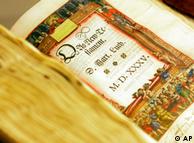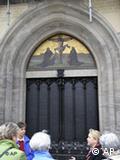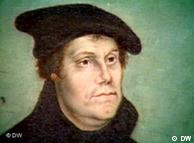History | 16.11.2009 Martin Luther's 95 T - October 31, 1517
History | 16.11.2009
Martin Luther's 95 Theses - October 31, 1517
Martin Luther (1483 - 1546) had been a preacher at the church in Wittenberg since 1514. His rhetorical talents made him popular among his congregation. He could often be found in his study, deeply absorbed in reading the Bible. Luther wanted to change the way people related to God by making the scriptures more accessible.
But the church in Rome had already defined this relationship: God spoke to the people via the pope in Rome, and through the pope's representatives, in other words, priests and bishops. In this way, the church had a monopoly when it came to interpreting the Bible, and deciding what sanctions should be imposed for transgressions of biblical rules.
Objection to church practices
Luther interpreted the gospels of the New Testament anew, and so came up with a different Christian paradigm. For him, there was no apostolic mediation necessary for people to have a relationship with God. All that was needed was the Bible (primacy of the scriptures), Jesus Christ (primacy of Christ) and God's mercy (primacy of grace).
 Bildunterschrift: Großansicht des Bildes mit der Bildunterschrift: A New Testament by Martin Luther
Bildunterschrift: Großansicht des Bildes mit der Bildunterschrift: A New Testament by Martin Luther
But it was the sale of indulgences - the profits of which were going toward the building of the new St. Peter's cathedral in Rome - which sparked the Reformation. Additionally, this trafficking in the pardon of sins was also financing the lavish lifestyle of Pope Leo X (1475 - 1521), who was notorious for always being on the verge of debt.
When Martin Luther sat down at his desk in his priests' accommodation in Wittenberg to write the famed 95 Theses, he was only trying to right what he saw as wrongs perpetrated by the church in Rome (secularization, circumvention of celibacy). He wasn't seeking an argument with the pope, nor was he trying to establish a new church. That's why, on that fateful October 31, 1517, he didn't "nail" his theses on the door of the church of All Saints, rather, he sent them to friends for a "disputation." (It was, however, customary to advertise a disputation by posting theses on the church door). He wasn't a revolutionary on this day - he was an impassioned monk who was worried about the salvation of the people in his congregation. The reaction to his theses, which were quickly translated, printed and widely copied, turned him from a monk to a revolutionary who shook the medieval world to its core.
Refusal to recant
 Bildunterschrift: Großansicht des Bildes mit der Bildunterschrift: Tourists stand in front of the church door in Wittenberg where Luther is purported to have posted his theses
Bildunterschrift: Großansicht des Bildes mit der Bildunterschrift: Tourists stand in front of the church door in Wittenberg where Luther is purported to have posted his theses
Pope Leo X deployed a series of theologians and envoys against Luther, and threatened him with excommunication should he refuse to recant - all without success. In April 1521, Luther appeared before the Diet of Worms, where he again refused to recant. He was declared an outlaw, and it was a made a crime in Germany for anyone to give him food or shelter.
However, Luther found support among the population, and in particular, from Frederick III, Elector of Saxony (1463 - 1525). Frederick hid Luther at Wartburg Castle, where he pretended to be a knight called Junker Joerg. There, he translated the New Testament into German and wrote numerous essays. His teachings quickly spread across the European continent.
The conflict with the Catholic Church, as the Roman Church was by then known, grew increasingly violent. Both sides took up arms. The religious conflict eventually evolved into the Thirty Years' War (1618 - 1648), which ended with a treaty declaring religious freedom in Germany and Europe.
Author: Matthias von Hellfeld (dc)
Editor: Andreas Illmer

Comments